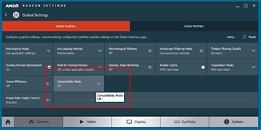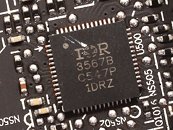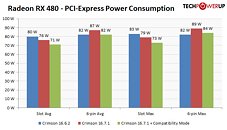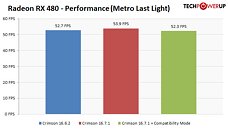Friday, July 8th 2016

AMD Releases PCI-Express Power Draw Fix, We Tested, Confirmed, Works
Earlier today, AMD has posted a new Radeon Crimson Edition Beta, 16.7.1, which actually includes two fixes for the reported PCI-Express overcurrent issue that kept Internet people busy the last days.
The driver changelog mentions the following: "Radeon RX 480's power distribution has been improved for AMD reference boards, lowering the current drawn from the PCIe bus", and there's also a second item "A new "compatibility mode" UI toggle has been made available in the Global Settings menu of Radeon Settings. This option is designed to reduce total power with minimal performance impact if end users experience any further issues."In order to adjust the power distribution between PCI-Express slot power and power drawn from the PCI-Express 6-pin power connector, AMD uses a feature of the IR3567 voltage controller that's used on all reference design cards.This feature lets you adjust the power phase balance by changing the controller's configuration via I2C (a method to talk to the voltage controller directly, something that GPU-Z uses too, to monitor VRM temperature, for example). By default, power draw is split 50/50 between slot and 6-pin, this can be adjusted per-phase, by a value between 0 to 15. AMD has chosen a setting of 13 for phases 1, 2 and 3, which effectively shifts some power draw from the slot away onto the 6-pin connector, I'm unsure why they did not pick a setting of 15 (which I've tested to shift even more power).
The second adjustment is an option inside Radeon Settings, called "Compatibility Mode", kinda vague, and the tooltip doesn't reveal anything else either. Out of the box, the setting defaults to off and should only be employed by people who still run into trouble, even with the adjusted power distribution from the first change, which is always on and has no performance impact. When Compatibility Mode is enabled, it will slightly limit the performance of the GPU, which results in reduced overall power draw.
We tested these options, below you will find our results using Metro Last Light (with the card being warmed up before the test run). First we measured power consumption using the previous 16.6.2 driver, then we installed 16.7.1 (while keeping Compatibility Mode off), then we turned Compatibility Mode on.As you can see, just the power-shift alone, while working, is not completely sufficient to reduce slot power below 75 W, we measured 76 W. As the name suggests, the changed power distribution results in increased power draw from 6-pin, which can easily handle slightly higher power draw though.
With the Compatibility Mode option enabled, power from the slot goes down to 71 W only, which is perfectly safe, but will cost performance.
AMD has also promised improved overall performance with 16.7.1, so we took a look at performance, using Metro again.Here you can see that the new driver adds about 2.3% performance, which is a pretty decent improvement. Once you enable Compatibility Mode though, performance goes down slightly below the original result (0.8% lower), which means Compatibility Mode costs you around 3%, in case you really want to use it. I do not recommend using Compatibility Mode, personally I don't think anyone with a somewhat modern computer would have run into any issues due to the increased power draw in the first place, neither did AMD. It is good to see that AMD still chose to address the problem, and solved it fully, in a good way, and quick.
The driver changelog mentions the following: "Radeon RX 480's power distribution has been improved for AMD reference boards, lowering the current drawn from the PCIe bus", and there's also a second item "A new "compatibility mode" UI toggle has been made available in the Global Settings menu of Radeon Settings. This option is designed to reduce total power with minimal performance impact if end users experience any further issues."In order to adjust the power distribution between PCI-Express slot power and power drawn from the PCI-Express 6-pin power connector, AMD uses a feature of the IR3567 voltage controller that's used on all reference design cards.This feature lets you adjust the power phase balance by changing the controller's configuration via I2C (a method to talk to the voltage controller directly, something that GPU-Z uses too, to monitor VRM temperature, for example). By default, power draw is split 50/50 between slot and 6-pin, this can be adjusted per-phase, by a value between 0 to 15. AMD has chosen a setting of 13 for phases 1, 2 and 3, which effectively shifts some power draw from the slot away onto the 6-pin connector, I'm unsure why they did not pick a setting of 15 (which I've tested to shift even more power).
The second adjustment is an option inside Radeon Settings, called "Compatibility Mode", kinda vague, and the tooltip doesn't reveal anything else either. Out of the box, the setting defaults to off and should only be employed by people who still run into trouble, even with the adjusted power distribution from the first change, which is always on and has no performance impact. When Compatibility Mode is enabled, it will slightly limit the performance of the GPU, which results in reduced overall power draw.
We tested these options, below you will find our results using Metro Last Light (with the card being warmed up before the test run). First we measured power consumption using the previous 16.6.2 driver, then we installed 16.7.1 (while keeping Compatibility Mode off), then we turned Compatibility Mode on.As you can see, just the power-shift alone, while working, is not completely sufficient to reduce slot power below 75 W, we measured 76 W. As the name suggests, the changed power distribution results in increased power draw from 6-pin, which can easily handle slightly higher power draw though.
With the Compatibility Mode option enabled, power from the slot goes down to 71 W only, which is perfectly safe, but will cost performance.
AMD has also promised improved overall performance with 16.7.1, so we took a look at performance, using Metro again.Here you can see that the new driver adds about 2.3% performance, which is a pretty decent improvement. Once you enable Compatibility Mode though, performance goes down slightly below the original result (0.8% lower), which means Compatibility Mode costs you around 3%, in case you really want to use it. I do not recommend using Compatibility Mode, personally I don't think anyone with a somewhat modern computer would have run into any issues due to the increased power draw in the first place, neither did AMD. It is good to see that AMD still chose to address the problem, and solved it fully, in a good way, and quick.




147 Comments on AMD Releases PCI-Express Power Draw Fix, We Tested, Confirmed, Works
The card will not draw full current while being idle on desktop , so obviously you can turn the second adjustment option (Compatibility Mode) on before running any heavy 3D application .
So it actually works and the performance does not suffer :)
Nice job AMD.
@tPU and chance of running a few more games to see how they react?
So, AMD actually delivered best of both worlds. Not only they fixed power delivery of PCIe without performance penalty, they actually delivered factory over-boosted card at expense of slightly higher power consumption. Because when you flip Compatibility mode ON, you actually restrict it to official 150W.
So, for consumers, it's actually a double win. Good job AMD and good job reviewers spotting this anomaly. In the end, we, the consumers benefit the most from all this.
EDIT:
They should rename Compatibility Mode to Power Saving+, Enhanced Power Saving or something more descriptive by itself than Compatibility Mode which can mean anything from software features to hardware features...
Very nice of AMD to get the bugs worked out while I was waiting for the card to arrive :D
Original Post: Glad they were able to tweak and address the problem with a software update.
The new driver sets the 12V bias to the 6pin connector, the compatibility mode just puts the power limit to 150w. It's a different fix for folks that still have problems with the 6pin bias fix; likely those with very old motherboards with power delivery systems that can't deal with the load spikes.The bias has a maximum of .15 according to W1zard. You can't set all the power to come from the 6pin connector and even if you could it's not advisable anyway since each phase can deal 40w. If you switched everything to the 6pin it could only draw 120w at most.
www.overclock.net/t/1604979/a-temporary-fix-for-the-excess-pci-e-slot-power-draw-for-the-reference-rx-480-cards/110#post_25324219
It increases the TDP to 250W~ by shifting the power targets, so -50% actually becomes the current/stock (0%) default of 110W and the +50% is now 250W. I believe these values are for the GPU/vCore itself and not the entire card. So you can imagine the added headroom.
An added bonus is that it also increases the limit on the memory so the maximum is 2500 MHz instead of 2250.
As always with mods like these: use at your own risk. Things can go kaboom if you don't know what you're doing.
@Shamalamadingdong
Yeah, I'm aware of the risks, but that applies to every overclock. Still, the headroom can be a lot higher than around 150W as initially thought. If user has PSU powerful enough to feed 6pin, VRM is there to deliver it if needed. Far beyond the original specs. Meaning AIB's only have to slam better cooling on reference design. They don't even have to redesign PCB and components on it to gain headroom.
Now then, we just need the aftermarket variants to allow better overclocking or better voltage control on the reference (I assume we will still get that at some point).
Very likely RTG is focusing on 480 driver now and somehow messed up driver support for previous gen cards. Guess I will just wait until a newer driver that does not solely focus on RX480 then.
And yes I have already submitted the problem to RTG.